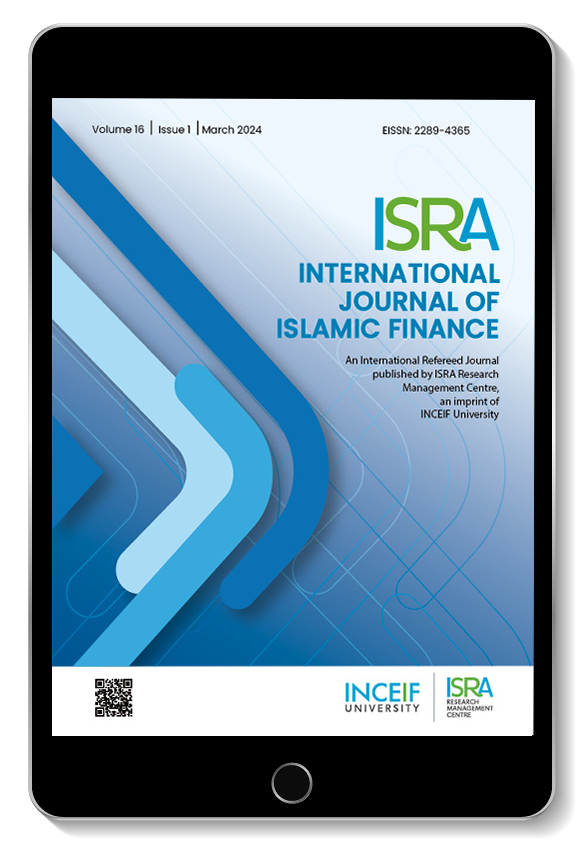Who Gets Believed? Trust and Investor Reaction to Earnings Announcements in Sharīʿah-Compliant vs. Sharīʿah Non-Compliant Firms
IF 2.8
Q2 BUSINESS, FINANCE
引用次数: 0
Abstract
Purpose ‒ Considering the proclamations of trustworthiness within the Islamic financial system and the positive relationship between stock market reaction and earnings announcement of the trustworthy firm, this paper aims to empirically test the presence of trust in Sharīʿah-compliant listed firms in Pakistan. Design/Methodology/Approach ‒ The research question has been addressed by investigating firms listed on the Pakistan Stock Exchange (PSX) from 1 July 2019 to 30 June 2020. Event study method has been used by taking Abnormal Return Variance (ARV) and Abnormal Trading Volume (ATV) as proxies to measure the investors’ reaction following earnings announcements. Findings ‒ The results suggest that stock price variations around earnings announcements are negatively related to trustworthy firms compared to less-trusted firms (i.e., Sharīʿah non-compliant firms). For ATV, it was found that traders react to annual earnings announcements for both types of firms in a similar way. Originality/Value ‒ This research is an attempt to evaluate the Islamic financial system from its trustworthiness perspective. Sufficient literature has already documented that being trustworthy is obligatory for Sharīʿah-compliant firms. This study contributes to the literature by examining whether the market/investors trust such firms or not. Research Limitations/Implications ‒ This research is based on a single-country analysis with a research span of one year. Cross-country analysis with a broader time horizon may give further clarity. Practical Implications ‒ This paper has made a valuable contribution to the literature by providing the guideline on how investors’ reactions to Sharīʿah-compliant firms differ from their reactions to Sharīʿah non-compliant firms. It also indicates how religious elements may subdue other social factors such as trust. This paper has also explored the market reaction by assessing both the liquidity and volatility of the stock market in Pakistan.谁会被相信?信托和投资者对遵守《沙尔基法》与不遵守《沙尔基法》公司的收益公告的反应
目的——考虑到伊斯兰金融体系中的可信声明,以及股票市场反应与可信公司盈利公告之间的正相关关系,本文旨在实证检验巴基斯坦Sharīah合规上市公司的信任存在。设计/方法/方法-研究问题已通过调查2019年7月1日至2020年6月30日在巴基斯坦证券交易所(PSX)上市的公司来解决。采用事件研究法,以异常回报方差(ARV)和异常交易量(ATV)为指标,衡量投资者在盈利公告后的反应。研究结果表明,与不太受信任的公司(即Sharīʿah不合规公司)相比,盈利公告前后的股价变化与值得信任的公司呈负相关。亚视发现,交易员对这两类公司的年度盈利公告的反应相似。独创性/价值——本研究试图从可信度的角度评估伊斯兰金融体系。充分的文献已经证明,对Sharīah合规的公司来说,值得信赖是必须的。本研究通过考察市场/投资者是否信任此类公司来为文献做出贡献。研究局限性/影响——本研究基于一年研究跨度的单一国家分析。具有更宽时间范围的跨国分析可能会提供进一步的清晰度。实际意义——本文为文献做出了宝贵贡献,提供了投资者对Sharīʿah合规公司的反应与对Sharā\703 ah不合规公司的不同反应的指南。它还表明了宗教因素是如何战胜信任等其他社会因素的。本文还通过评估巴基斯坦股市的流动性和波动性,探讨了市场反应。
本文章由计算机程序翻译,如有差异,请以英文原文为准。
求助全文
约1分钟内获得全文
求助全文
来源期刊

ISRA International Journal of Islamic Finance
BUSINESS, FINANCE-
CiteScore
3.40
自引率
17.40%
发文量
18
审稿时长
20 weeks
期刊介绍:
It is the aspiration of the editorial committee that IJIF achieves the highest rank in quality and substance. It is thus our aim that the journal be carried in the Thompson Reuters’ ISI and Scopus databases. By ensuring high standards in articles published in Islamic finance we ensure that further innovation and research is carried out and promoted in the Islamic finance industry and academia. IJIF publishes 2 issues per annum.
 求助内容:
求助内容: 应助结果提醒方式:
应助结果提醒方式:


